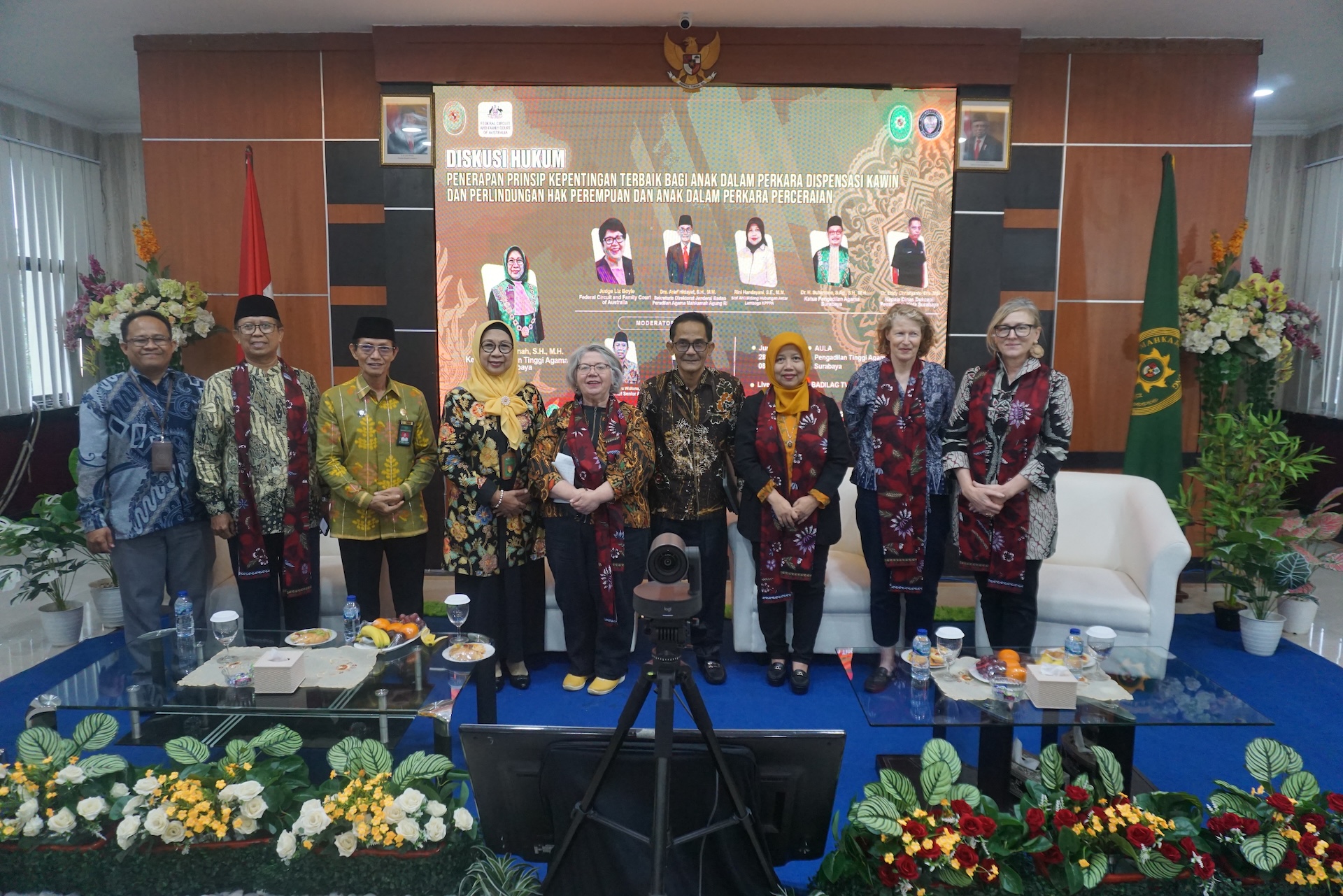June 25th is a historic day for the Supreme Court of Indonesia, Federal Court of Australia and Federal Circuit and Family Court of Australia. The Supreme Court of Indonesia, Federal Court of Australia (FCA) and the Federal Circuit and Family Court of Australia (FCFCOA) signed a memorandum of understanding on Judicial Cooperation to advance and further enhance each country’s understanding of the other country’s laws, legal systems and legal institutions with a view to promoting mutual respect. This memorandum is a renewed of the judicial cooperation between two countries that was conducted in 2004. The FCA delegation was led by Acting Chief Justice Berna Collier, accompanied by Justice Stephen Burley, Justice Robert Bromwich, and Principal Registrar Sia Lagos, FCFCOA Delegation was led by Chief Justice William Alstergren and accompanied by Judge Elizabeth Boyle, while the Supreme Court of Indonesia was led by Chief Justice Prof. Dr. H.M. Syarifuddin, S.H., M.H., along with other the Supreme Court leaders.
As part of series activities of the commemoration, The FCFCOA and the Directorate General of Religious Judiciary, which was facilitated by the Australia Indonesia Partnership for Justice 2 (AIPJ2) organized a hybrid (online and offline) webinar at three locations: Bogor Religious Court (June 26), Directorate General of Religious Judiciary (June 27), and Surabaya High Religious Court (June 28).
The webinar at the Bogor Religious Court focused on the theme: "Reviewing Evidence of Family Violence in Family Law Cases" with speakers including Supreme Court Justice Dr. H. Yasardin, S.H., M.Hum., Chief Justice FCFCOA William Alstergren, Judge Liz Boyle, Chief Judge of Bogor Religious Court Ruslan, S.Ag., S.H., M.H., Deputy Chief Judge of Bogor District Court Sonny A. Blegoer Laoemoery S.H., PEKKA Co-Director Fitria Villa Sahara, S.IP, M.COMDEV, with moderator Senior Advisor AIPJ2 Drs. H. Wahyu Widiana, M.A.
The webinar at the Directorate General of Religious Courts discussed the theme: "Marriage Dispensation Cases Handling and Child Marriages Prevention in Religious Courts" with speakers including Director General of Religious Courts Drs. H. Mukhlis, S.H., M.H., Judge FCFCOA Liz Boyle, Acting Director of Administration Development for Religious Courts Arief Hidayat, Statistics Indonesia representative Amiek Chamami, Ministry of Religious Affairs Indonesia representative Dr. H. Anwar Sa’adi, Ministry of Women’s Empowerment and Child Protection staff expert Rini Handayani, and PEKKA Co-Director Fitria Villa Sahara, with moderator Yudi Hermawan, Judicial Assistant of Director General of the Directorate General of Religious Judiciary.
The final webinar held at the Surabaya High Religious Court addressed the theme: "for the Best Interests of the Child Principle Application in Marriage Dispensation Cases and Women and Children’s Rights Protection in Divorce Cases." Speakers included Judge FCFCOA Liz Boyle, Acting Director of Administration Affair of the Directorate General of Religious Judiciary Arief Hidayat, Ministry of Women’s Empowerment and Child Protection staff expert Rini Handayani, Chief Judge of Surabaya Religious Court Suhartono, and Head of Population and Civil Registration Department of Surabaya, with moderator Yudi Hermawan and Drs. H. Wahyu Widiana, M.A.
The webinar participants are from the 412 Religious Courts of first instance and 34 Religious Courts of Appeal across Indonesia via online (Zoom meeting and live streaming on Badilag TV YouTube), and NGOs focusing on women and children protection.
Director General of Religious Courts Drs. H. Mukhlis, S.H., M.H. appreciated the webinar, noting that the substances of the presentation were vital in efforts to protect the community in accordance with the duties and functions of religious courts. Furthermore, it also shared best practice experiences in handling cases in Indonesia and the Family Court of Australia. He added that such webinars would continue to be scheduled due to their significant benefits.
Similarly, Cate Sumner and Leisha Lister, Senior Advisors from AIPJ2 who also attended the webinar, stated that the practice of resolving cases at the Religious Courts has been increasingly effective, allowing the public to greatly benefit from the presence of Religious Courts. (AH)

